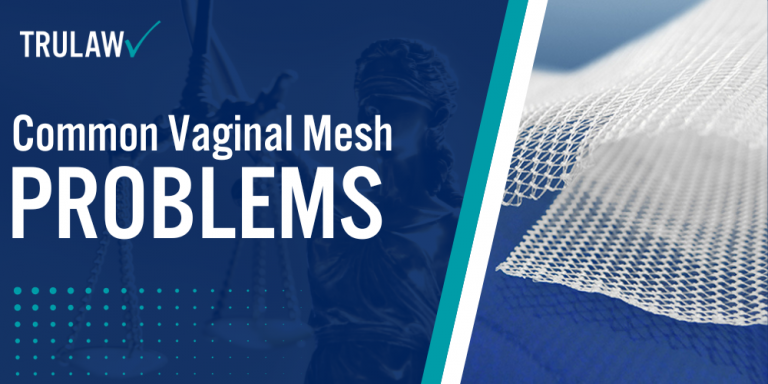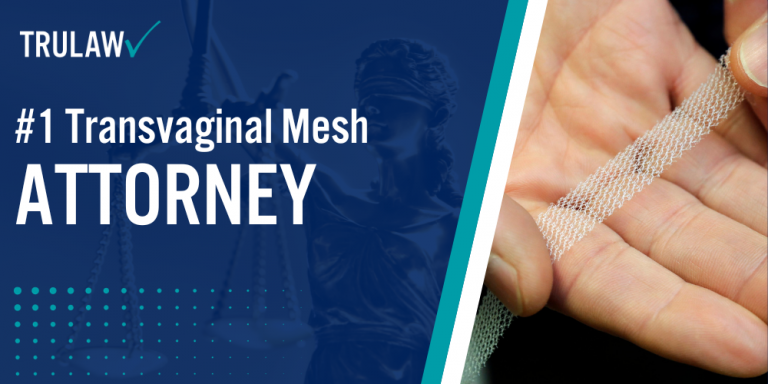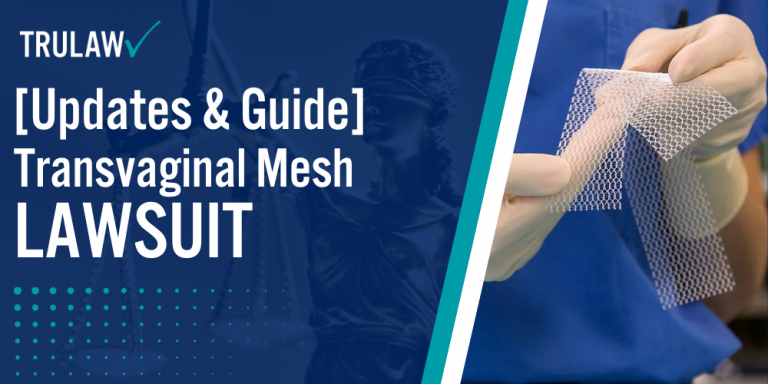How to Hire the Best Transvaginal Mesh Lawyer for Your Case
- Last Updated: July 9th, 2024

Attorney Jessie Paluch, founder of TruLaw, has over 25 years of experience as a personal injury and mass tort attorney, and previously worked as an international tax attorney at Deloitte. Jessie collaborates with attorneys nationwide — enabling her to share reliable, up-to-date legal information with our readers.
Legally Reviewed
This article has been written and reviewed for legal accuracy and clarity by the team of writers and legal experts at TruLaw and is as accurate as possible. This content should not be taken as legal advice from an attorney. If you would like to learn more about our owner and experienced injury lawyer, Jessie Paluch, you can do so here.
Fact-Checked
TruLaw does everything possible to make sure the information in this article is up to date and accurate. If you need specific legal advice about your case, contact us by using the chat on the bottom of this page. This article should not be taken as advice from an attorney.
Key takeaways:
- Select an attorney with specific experience in transvaginal mesh lawsuits, as they will be more familiar with the medical issues and legal strategies for pelvic organ prolapse (POP) and stress urinary incontinence (SUI).
- Ensure your lawyer has a track record of holding sizeable medical device companies accountable and understands the FDA safety communications related to non-absorbable meshes.
- The right time to hire a transvaginal mesh attorney is immediately after experiencing complications, keeping in mind the statute of limitations, which ranges from one to six years, depending on your state.
How to Choose the Right Transvaginal Mesh Attorney for Your Case?
On this page, we’ll discuss how to get the right transvaginal mesh lawyer for your legal matter, product liability of transvaginal mesh manufacturers, who qualifies to file a transvaginal mesh lawsuit, and much more.

Intro to TruLaw: The #1 Transvaginal Mesh Lawyer
Key considerations when hiring a transvaginal mesh lawyer include:
- Specialized Experience: Look for a lawyer with specific experience in transvaginal mesh cases, indicating familiarity with the complexities of these lawsuits.
- Client Testimonials: Seek out feedback from previous clients to gauge the lawyer’s effectiveness and client satisfaction.
- Case Success Rate: Investigate the lawyer’s history of settlements and verdicts in transvaginal mesh cases to understand their success rate.
- Communication and Support: Ensure the lawyer you choose is communicative, responsive, and supportive throughout the legal process.
Our proven track record, combined with our compassionate approach and deep legal expertise, makes TruLaw the ideal partner in your journey toward justice.
Contact TruLaw using the chat on this page for a personalized case evaluation and to learn why we are the best choice for your transvaginal mesh lawsuit.
Table of Contents
Transvaginal Mesh Complications
Transvaginal mesh devices, utilized for treating pelvic organ prolapse and stress urinary incontinence, have been linked with various complications impacting the health and quality of life of patients.
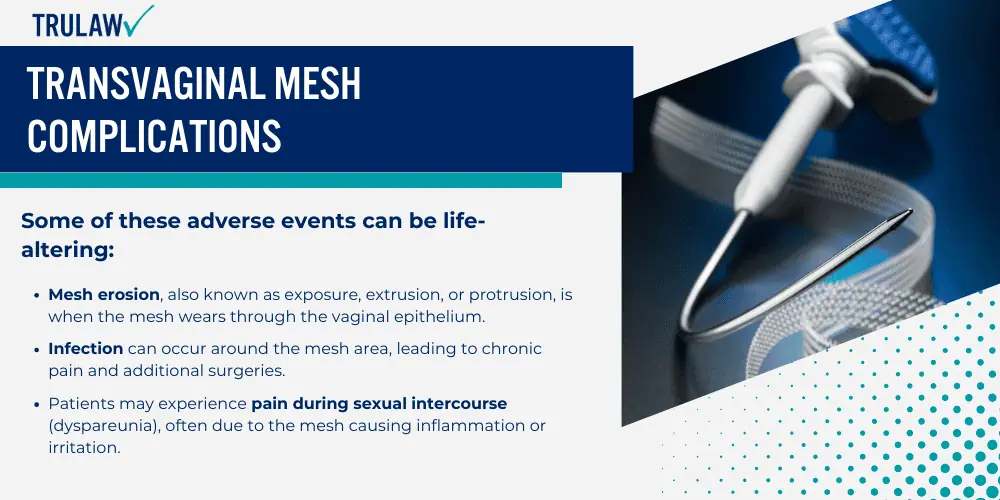
Common Complications and Risks
For those undergoing surgery involving transvaginal mesh, certain risks and complications are not uncommon.
Some of these adverse events can be life-altering:
- Mesh erosion, also known as exposure, extrusion, or protrusion, is when the mesh wears through the vaginal epithelium.
- Infection can occur around the mesh area, leading to chronic pain and additional surgeries.
- Patients may experience pain during sexual intercourse (dyspareunia), often due to the mesh causing inflammation or irritation.
- Vaginal scarring is a significant issue that can lead to decreased elasticity and flexibility of the vaginal wall.
- Organ perforation is a serious complication where the mesh can puncture surrounding organs.
- Urinary problems including incontinence can continue or even worsen after surgery.
Recognizing Symptoms of Mesh Failure
It is paramount for patients to be vigilant in recognizing the symptoms that may indicate a failure of the transvaginal mesh.
These warning signs often necessitate immediate medical attention:
- Persistent vaginal bleeding or discharge that is unusual in terms of color, smell, or quantity.
- Feelings of pressure or pain in the pelvic area, which may indicate mesh erosion or organ perforation.
- Recurrent infections, which could be a sign of the body rejecting the mesh or an erosion-related complication.
- Difficulty with urination or painful urination, which could indicate a urinary tract issue related to the mesh.
- Onset of new pelvic or lower back pain after implantation, which warrants investigation for possible mesh complications.
- For sexually active individuals, pain during intercourse is a clear indicator that should be addressed with a healthcare provider.
Legal Aspects of Mesh Litigation
When pursuing a transvaginal mesh lawsuit, understanding the legal procedures and maintaining an informed client-lawyer relationship are vital steps toward seeking justice.
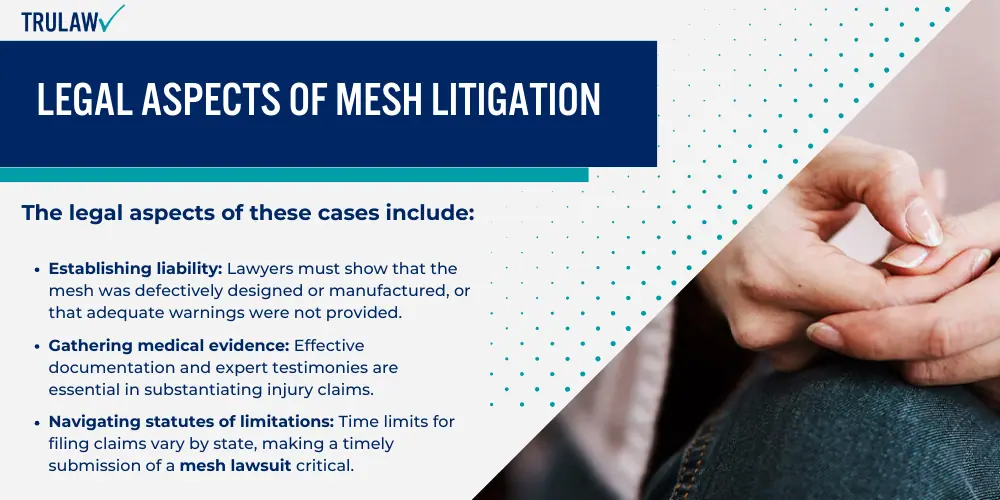
Understanding Mesh Lawsuits
Transvaginal mesh lawsuits stem from complications caused by surgical mesh implants used in pelvic organ prolapse and stress urinary incontinence treatments.
Plaintiffs allege that these devices caused harm, leading to legal action against manufacturers.
The legal aspects of these cases include:
- Establishing liability: Lawyers must show that the mesh was defectively designed or manufactured, or that adequate warnings were not provided.
- Gathering medical evidence: Effective documentation and expert testimonies are essential in substantiating injury claims.
- Navigating statutes of limitations: Time limits for filing claims vary by state, making a timely submission of a mesh lawsuit critical.
- Understanding class action suit: Determining if a case will be part of a broader class action or handled individually is a key strategic decision.
- Assessing damages: Calculating economic and non-economic damages to ensure just compensation is a central focus.
- Negotiating settlements: Many cases are resolved through settlements rather than going to trial, requiring skilled negotiation.
Litigation often confronts a complex legal landscape, where knowledge of precedent and regulatory issues plays a crucial role.
Client-Lawyer Relationship in Mesh Cases
The dynamic between a client and their law firm can influence the outcome of a vaginal mesh lawsuit.
Key aspects of this relationship include:
- Transparent communication: Clear, ongoing dialogue regarding case details, developments, and expectations.
- Understanding legal fees: Knowledge of how the law firm structures its payment, whether on a contingency fee basis or otherwise.
- Client involvement: The degree to which clients wish to be involved in their case, as some prefer regular updates while others might opt for minimal involvement.
- Managing expectations: Lawyers provide realistic perspectives on likely outcomes, timelines, and potential compensation.
The Role of a Transvaginal Mesh Lawyer
The expertise of a transvaginal mesh lawyer plays a significant part in securing justice for those affected by vaginal mesh complications.
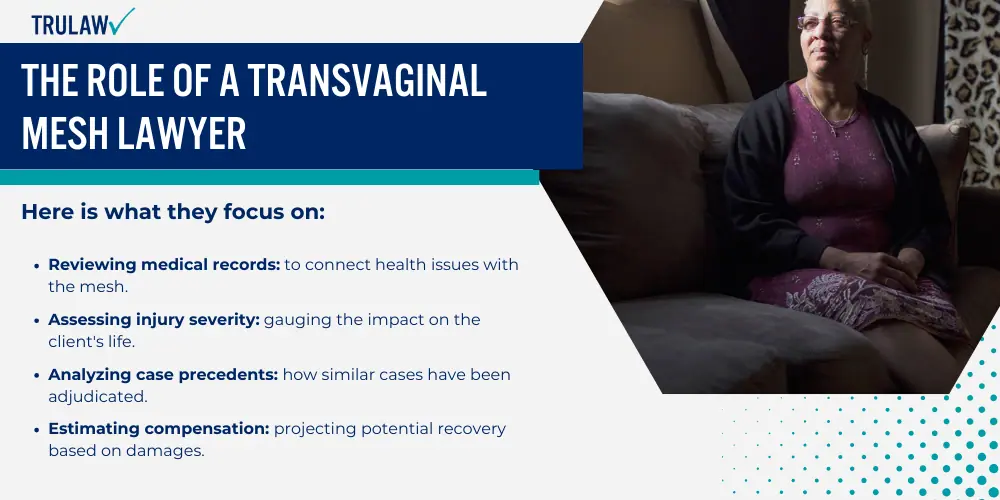
These attorneys provide a free consultation and guide clients through their legal recourse.
Evaluating a Potential Case
A transvaginal mesh lawyer thoroughly assesses each aspect of a potential vaginal mesh case to determine its viability.
Here is what they focus on:
- Reviewing medical records: to connect health issues with the mesh.
- Assessing injury severity: gauging the impact on the client’s life.
- Analyzing case precedents: how similar cases have been adjudicated.
- Estimating compensation: projecting potential recovery based on damages.
- Identifying the liable parties: often manufacturers of the mesh products.
- Considering statutes of limitations: ensuring timely case filing.
Navigating the Legal Process
Once a case is deemed actionable, the transvaginal mesh lawyer will embark on the legal journey with their client.
Key steps in the process include:
- Filing a complaint: officially initiating the lawsuit.
- Discovery phase: gathering and exchanging evidentiary support.
- Expert testimony: leveraging professional opinions to solidify the case.
- Negotiating settlements: striving to reach a fair compensation without trial.
- Trial preparation: readying for court if settlement talks do not resolve the case.
- Court representation: advocating on behalf of the client during legal proceedings.
Transvaginal Mesh Surgical Perspectives
Transvaginal mesh implants are used to treat pelvic organ prolapse and stress urinary incontinence.
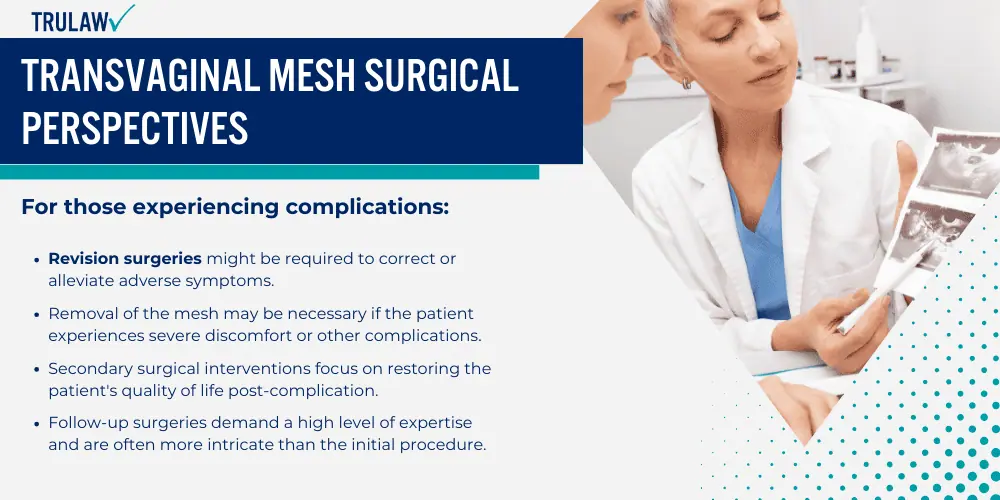
The application of mesh surgery has evolved, and both support and concerns within the American medical systems have been encountered due to its associated risks and complications.
Treatment and Revision Surgeries
In addressing pelvic organ prolapse, specialists may consider transvaginal mesh or bladder sling procedures.
However, not all surgeries do not require follow-up treatment.
For those experiencing complications:
- Revision surgeries might be required to correct or alleviate adverse symptoms.
- Removal of the mesh may be necessary if the patient experiences severe discomfort or other complications.
- Secondary surgical interventions focus on restoring the patient’s quality of life post-complication.
- Follow-up surgeries demand a high level of expertise and are often more intricate than the initial procedure.
Medical Professionals’ Responsibilities
Surgeons who perform transvaginal mesh implant surgeries must inform their patients about the risks and benefits of this procedure.
When undertaking mesh surgery, medical professionals have a set of obligations to fulfill:
- Ensuring patients are well-informed of potential risks and benefits of transvaginal mesh implant.
- Being vigilant in recognizing and addressing any complications that may arise post-surgery.
- Maintaining a high standard of care during the initial vaginal mesh placement and any revision surgeries.
- Reporting any adverse outcomes to relevant authorities to contribute to the development of safer surgical techniques.
Product Liability of Transvaginal Mesh Manufacturers
Manufacturers of transvaginal mesh are subject to product liability, particularly when injuries are linked to defective transvaginal mesh implants.
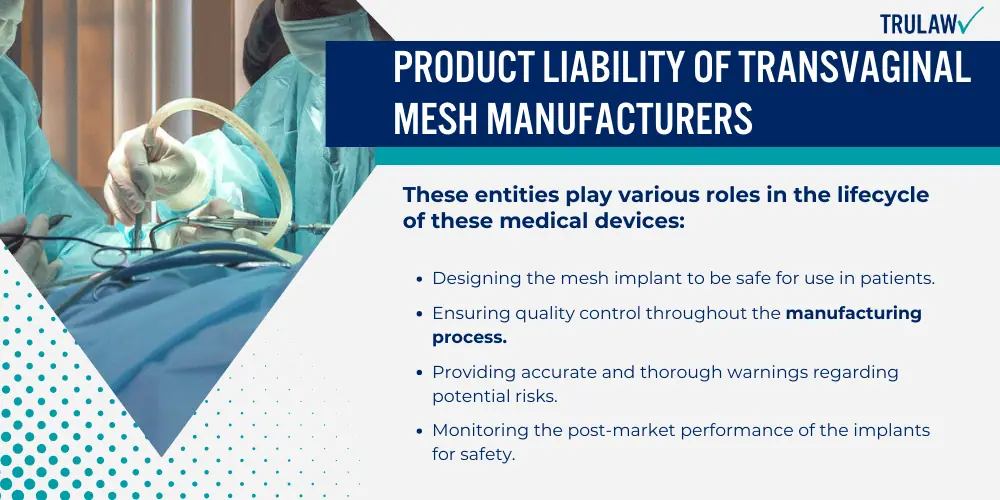
Understanding the roles and responsibilities is pivotal for any legal recourse.
Identifying Responsible Parties
When complications arise from transvaginal mesh, identifying the liable manufacturers is a primary step for legal action.
These entities play various roles in the lifecycle of these medical devices:
- Designing the mesh implant to be safe for use in patients.
- Ensuring quality control throughout the manufacturing process.
- Providing accurate and thorough warnings regarding potential risks.
- Monitoring the post-market performance of the implants for safety.
FDA’s Role and Safety Communications
The FDA plays a significant role in the oversight of medical devices, including transvaginal mesh.
Here are the steps the agency takes to safeguard the public:
- Issuing safety communications: to inform both the medical community and the public about risks associated with these surgical mesh devices.
- Approving products: before they can be marketed, ensuring they meet safety standards.
- Performing post-market surveillance to detect any adverse outcomes related to the use of these devices.
- Taking regulatory actions, if necessary, which can include recalls or safety alerts.
In their role, the FDA has issued several safety communications to raise awareness about the complications associated with transvaginal mesh.
Patient Experiences and Outcomes
In transvaginal mesh litigation, patient experiences and outcomes form the crux of legal arguments and the emotional core of what injured parties endure.
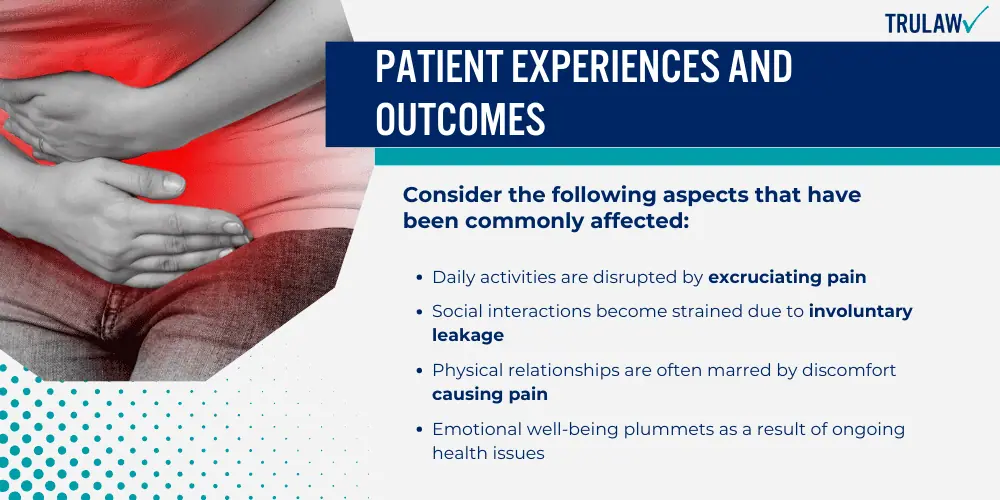
These accounts and case studies offer a window into the real-world effects of pelvic mesh on women’s lives.
Effects on Quality of Life
For many women, the implantation of pelvic mesh was believed to be a solution for urinary incontinence and other complications associated with weakened pelvic organs.
Yet, numerous patients report a deterioration in their quality of life due to mesh complications.
Consider the following aspects that have been commonly affected:
- Daily activities are disrupted by excruciating pain
- Social interactions become strained due to involuntary leakage
- Physical relationships are often marred by discomfort causing pain
- Emotional well-being plummets as a result of ongoing health issues
Case Studies and Testimonials
Real-world examples demonstrate the breadth of impact that transvaginal mesh can have.
The following bullet points encapsulate different facets of how injured women cope post-surgery and the outcomes they face:
- Many women experience persistent pelvic discomfort even after corrective procedures.
- Testimonials reveal that some patients require multiple surgeries to address mesh complications.
- Legal cases often build on the narratives of injured women whose professional lives have been adversely affected.
- Personal accounts from patients highlight the emotional toll and relational strain resulting from ongoing mesh complications.
The convergence of these experiences paints a vivid picture of the need for rigorous legal support and a deeper understanding of the potential consequences of pelvic mesh implants.
Financial Implications of Surgical Mesh Complications
Transvaginal mesh complications can lead to significant financial stress due to various expenses and legal challenges associated with these health issues.
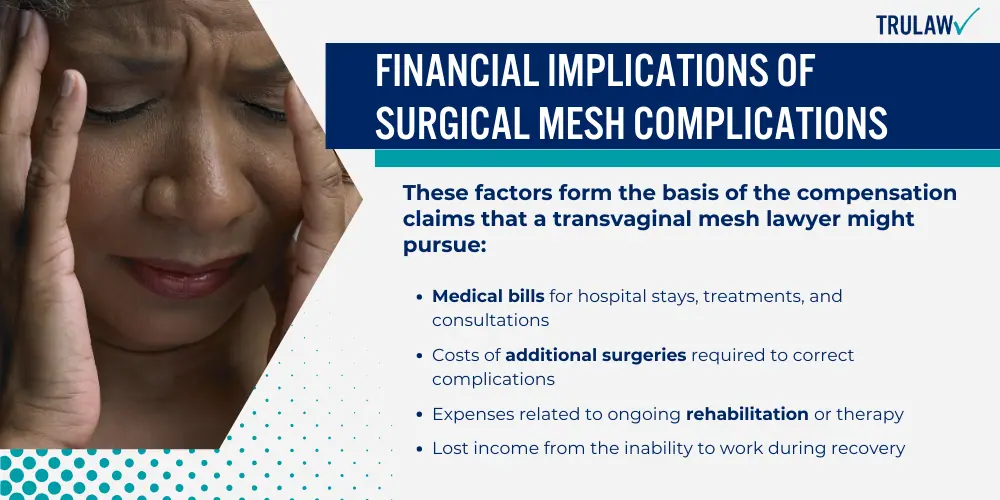
Calculating Damages and Losses
When an individual faces complications from a surgical mesh implant, several factors contribute to the economic burden.
These factors form the basis of the compensation claims that a transvaginal mesh lawyer might pursue:
- Medical bills for hospital stays, treatments, and consultations
- Costs of additional surgeries required to correct complications
- Expenses related to ongoing rehabilitation or therapy
- Lost income from the inability to work during recovery
- Potential loss of future earnings if the injuries lead to disability
- Pain and suffering endured as a result of the injury
It’s important that each of these elements are accounted for when seeking legal restitution.
Dealing with Insurance Companies
Navigating conversations with an insurance company after complications arise from a transvaginal mesh procedure can be a delicate process.
Here are steps an individual might take when interfacing with insurance providers:
- Documentation of all conversations and correspondences with the insurance company
- A thorough review of the patient’s policy details to understand what is covered
- Verification of all claim submissions to ensure completeness and accuracy
- Seeking legal advice if the insurance company disputes or denies coverage
- Preparation for potential negotiations regarding settlement offers
- Appealing any unfavorable decisions made by the insurance provider
In these cases, legal representation might be necessary to advocate for the patient’s financial rights and ensure that they receive the appropriate coverage based on their insurance policy.
Transvaginal Mesh Alternatives: Awareness and Education
In exploring alternatives to using transvaginal mesh for pelvic organ prolapse (POP) and stress urinary incontinence (SUI), educating patients and the public is fundamental.
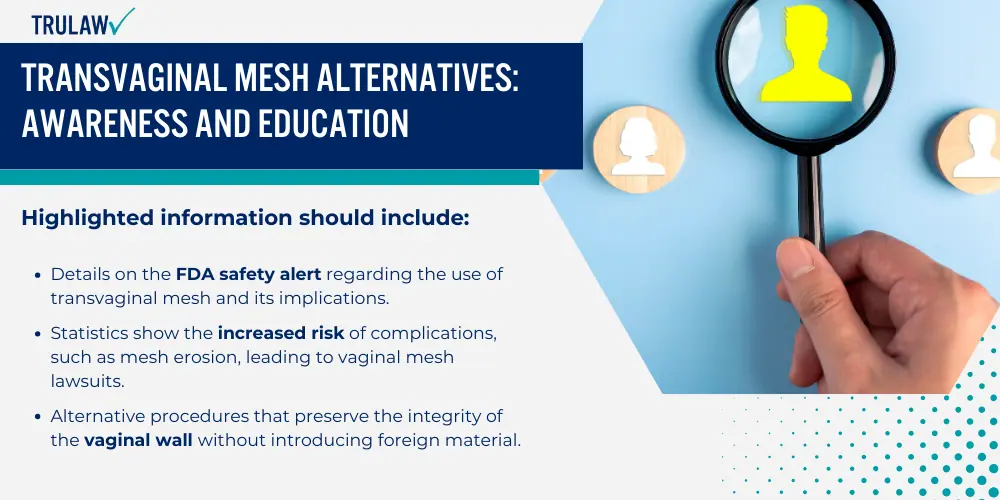
This leads not only to better health outcomes but also to informed decisions regarding potential legal actions for those affected by complications.
Public and Patient Awareness
Adequate public awareness and patient education are vital for understanding the risks associated with transvaginal mesh and its alternatives.
Materials should convey why caution is advised in using mesh for repair POP and treating POP.
Highlighted information should include:
- Details on the FDA safety alert regarding the use of transvaginal mesh and its implications.
- Statistics show the increased risk of complications, such as mesh erosion, leading to vaginal mesh lawsuits.
- Alternative procedures that preserve the integrity of the vaginal wall without introducing foreign material.
- Signs of urinary problems or complications that should prompt immediate medical attention.
Advocacy and Support for Affected Individuals
Advocacy and support services play a paramount role for individuals experiencing adverse outcomes post-transvaginal repair.
Education on these services can empower patients to seek help and possibly pursue legal action if necessary.
Strategic support includes:
- Counseling services that address the psychological impact of transvaginal mesh complications.
- Legal clinics focusing on mesh lawsuits to discuss the grounds for and process of seeking legal action.
- Support groups that connect individuals experiencing similar health issues, such as compromised pelvic region integrity.
- Health forums where specialists discuss transvaginal repair methods that minimize harm to the blood vessels and surrounding tissues of the vaginal opening.
Seeking Professional Help: TruLaw
When experiencing complications from a transvaginal mesh implant, it is essential to have a skilled legal professional by your side.
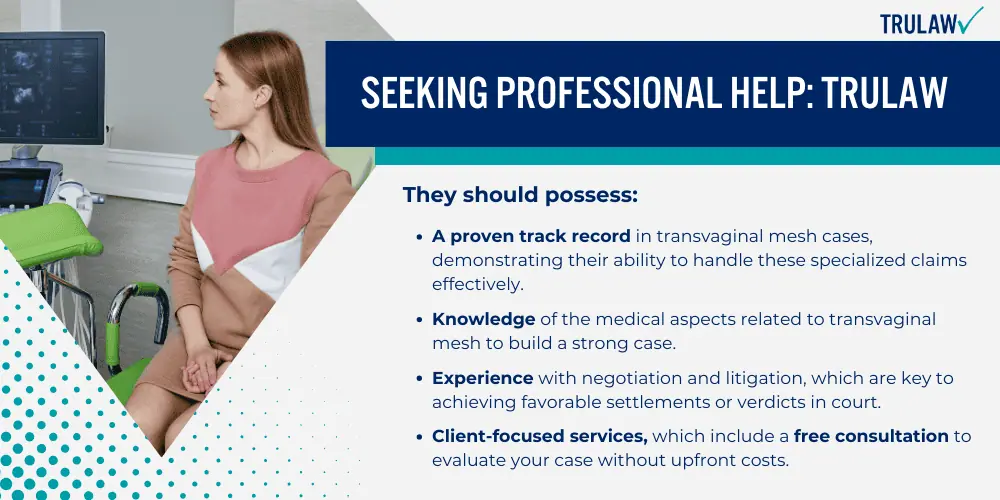
TruLaw offers experienced transvaginal mesh lawyers capable of providing quality legal assistance.
Finding the Right Transvaginal Mesh Lawyer
To ensure effective legal representation, selecting a transvaginal mesh lawyer with a specific set of qualifications is vital.
They should possess:
- A proven track record in transvaginal mesh cases, demonstrating their ability to handle these specialized claims effectively.
- Knowledge of the medical aspects related to transvaginal mesh to build a strong case.
- Experience with negotiation and litigation, which are key to achieving favorable settlements or verdicts in court.
- Client-focused services, which include a free consultation to evaluate your case without upfront costs.
TruLaw fits these criteria, having lawyers who are well-versed in the legal landscape of transvaginal mesh complications.
They understand the sensitivities involved and approach each case with the required diligence.
TruLaw is committed to helping clients with transvaginal mesh complications and follows these key principles:
- Lawyers at TruLaw are dedicated to helping clients undertake legal action with confidence, guiding them at every step.
- The law firm offers comprehensive support, from case evaluation to litigation, ensuring that each client’s voice is heard and their rights are protected.
- Free consultations are provided to help potential clients understand their options and the process ahead without any financial commitment.
- Lawyers at TruLaw are equipped to handle the intricacies of these cases, making the journey toward justice less daunting for their clients.
Frequently Asked Questions
-
What are the criteria for filing a transvaginal mesh lawsuit?
Individuals must demonstrate that they have suffered mesh complications directly linked to the transvaginal mesh implant.
The presence of adverse symptoms such as pain, infection, or mesh erosion typically forms the basis of a claim.
-
How do I find a qualified attorney for a vaginal mesh implant case?
Researching attorneys who specialize in medical device litigation is imperative.
Patients should look for an attorney with experience in transvaginal mesh cases, and a history of successful settlements or verdicts in this area.
-
What compensation might be available for transvaginal mesh complications?
Compensation for transvaginal mesh lawsuits may include coverage for medical expenses, lost wages, and pain and suffering.
In some instances, punitive damages might be awarded if egregious negligence is determined.
-
What is the typical process for a mesh sling lawsuit?
The lawsuit process generally begins with a consultation with a transvaginal mesh attorney, followed by the filing of a complaint.
Discovery ensues, where both parties gather evidence, and the case may proceed to trial or settle.
-
How long do I have to file a lawsuit after a mesh removal surgery?
The statute of limitations for filing a lawsuit will vary by state.
Potential plaintiffs should consult an attorney promptly to ensure they file their claim within the allowable time window following surgery.
-
What should I expect during the litigation of a vaginal mesh lawsuit?
Plaintiffs can expect to undergo discovery, where they will provide documentation of their injuries and may need to give a deposition.
They should be prepared for a potentially lengthy process, although many cases are settled before reaching trial.

Experienced Attorney & Legal SaaS CEO
With over 25 years of legal experience, Jessie is an Illinois lawyer, a CPA, and a mother of three. She spent the first decade of her career working as an international tax attorney at Deloitte.
In 2009, Jessie co-founded her own law firm with her husband – which has scaled to over 30 employees since its conception.
In 2016, Jessie founded TruLaw, which allows her to collaborate with attorneys and legal experts across the United States on a daily basis. This hypervaluable network of experts is what enables her to share reliable legal information with her readers!
You can learn more about the Transvaginal Mesh Lawsuit by visiting any of our pages listed below:
Here, at TruLaw, we’re committed to helping victims get the justice they deserve.
Alongside our partner law firms, we have successfully collected over $3 Billion in verdicts and settlements on behalf of injured individuals.
Would you like our help?
At TruLaw, we fiercely combat corporations that endanger individuals’ well-being. If you’ve suffered injuries and believe these well-funded entities should be held accountable, we’re here for you.
With TruLaw, you gain access to successful and seasoned lawyers who maximize your chances of success. Our lawyers invest in you—they do not receive a dime until your lawsuit reaches a successful resolution!
Do you believe you’re entitled to compensation?
Use our Instant Case Evaluator to find out in as little as 60 seconds!
Camp Lejeune’s water contamination issue spanned several decades starting in the 1950s. Exposure to these chemicals has been linked to various serious health issues, including cancer, organ diseases, and death.
Research is increasingly suggesting a link between the use of Tylenol during pregnancy and the development of neurodevelopmental disorders, such as autism and ADHD, in infants.
Legal action is being taken against manufacturers of Aqueous Film-Forming Foam (AFFF), a chemical used in fighting fires. The plaintiffs allege that exposure to the foam caused health issues such as cancer, organ damage, and birth and fertility issues.
Here, at TruLaw, we’re committed to helping victims get the justice they deserve.
Alongside our partner law firms, we have successfully collected over $3 Billion in verdicts and settlements on behalf of injured individuals.
Would you like our help?
